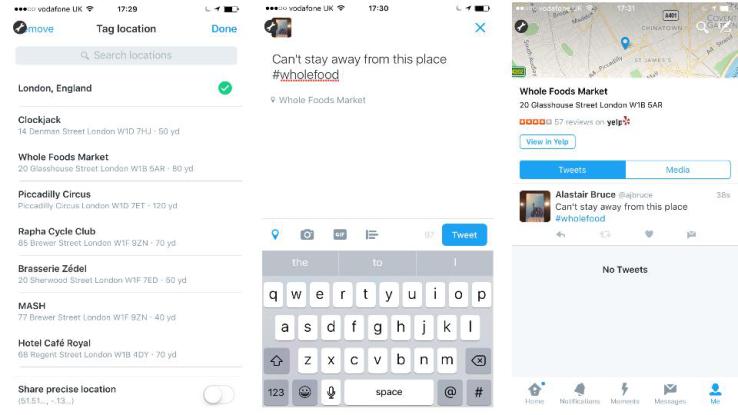

A year ago, Twitter ramped up its game in location services when it announced an integration with Foursquare to provide venue suggestions when you wanted to tag where you were Tweeting. Interestingly, that deal appears to have applied only to the U.S., and now that Twitter’s expanding the service, it has partnered with one of Foursquare’s big competitors, Yelp, to power it.
Today, Yelp announced a Twitter integration in the UK and Japan that will give Twitter users the option of selecting places provided by Yelp when they tag location in their Tweets. And, when users click on places when reading Tweets, they get a separate card with more details like address and Yelp rating, along with a deep link to go directly to view that venue on the Yelp app itself.
The service goes live on iOS and Android from today, and is coming soon to Twitter on the web, Yelp notes.
The UK and Japan integrations come about a month after Yelp quietly announced the feature in Germany, its first market for the service. It will also be coming to France in coming months, Yelp said.

Why these three countries first? First of all, Twitter’s in a deal with Foursquare at the moment in the U.S. so it seems that is out of the picture. (We have contacted Twitter with more questions about this, including whether Yelp will be taking over this feature in the U.S., and will update as we learn more.)
But also, the UK, Germany and Japan are strong countries for both Yelp and Twitter (Yelp perhaps being stronger than Foursquare in these places?), giving them a good head start in getting people to use the feature.
“Germans are increasingly showing their Yelp love,” writes Chad Richard, SVP for business and corporate development at Yelp, “so we thought it’s time to show some love right back. Not to mention, Hamburg is the host to awesome Yelp sales, engineering and product teams!” (Recall that Yelp acquired Restaurant-Kritik, based out of Hamburg, in 2014.)
The Yelp integration with Twitter is interesting for a few reasons:
First, it gives Twitter a little more staying power with consumers, with users potentially more interested in clicking on Tweets if they know they may get more information about a place as a result.
It’s also another way for Twitter to expand the functionality of its platform. Right now, there is little reason to tag a location or to look at someone else’s location tags, but if the Tweets are more tied into useful location data this might change that behavior.
Interestingly, Facebook came under a lot of fire when it replaced Instagram’s location tag (after acquiring Instagram) with its own check-ins, instead of Foursquare’s. But in the intervening years, Facebook has quietly built up a location-information giant that continues to grow, powered by check-ins on multiple apps, including its own.
And that data is now coming into its own when you consider Facebook’s advertising machine, and new services like the business-fuelled bots on Messenger: businesses feel confident using new services on Facebook, and investing in it as a marketing platform, when they can see it being used by its customers to market their venues organically. Tying social interactions to location is a strong route to revenue generation and commerce, and that’s a lesson that Twitter wants to follow.
More location data, generated and consumed by its own Tweeters, can get used by Twitter in a couple of different ways. First, it could lay the groundwork for a new advertising unit based around locations. Second, it could potentially sell that on to the companies that are being flagged in the tags.
For Yelp, this is one more way to give their location database some exercise — with Twitter joining a group that also includes Apple, which uses Yelp data in its Maps app.
And, in the long run it could help keep Yelp updated. Right now, users won’t have the option of checking in and rating a place, but you can see how this could be a logical next step. And as we’ve heard many times before, the value of your location database is only as good as its freshness, and this could help Yelp from becoming too stale.
This is not the first integration between Yelp and Twitter, but this rejoinder is a long time coming. It was back in 2009 when Yelp first gave its users the ability to share reviews directly on Twitter (as well as Facebook).

